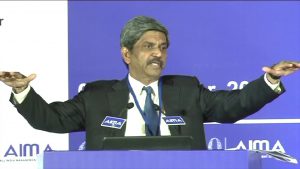Leadership needs “self education” in order to stay relevant and a leader “most surely needs to be a follower” to be a successful one, said Mr. Shiv Shivakumar, Past President, AIMA, Former Chairman, PepsiCo & Former Chief Executive Officer (CEO), Emerging Markets, Nokia at AIMA’s Dr. K.S. Basu Memorial Lecture.
AIMA had organised ‘Dr. K.S. Basu Memorial Lecture’ via Zoom, to honour the contributions of Dr. Kalyan Sundar Basu, one of the early pioneers of management education in India, and the first Director of the Jamnalal Bajaj Institute of Management Studies, besides, also being the President of the AIMA (1963- 1966). Mr. Shiv Shivakumar, Past President, AIMA, Former Chairman, PepsiCo & Former CEO, Emerging Markets, Nokia deliberated on the Memorial theme- ‘Leadership In The Knowledge Economy’.
A motivational speaker, business coach, management guru and author of many best-selling books on Management and Leadership, Mr. Shivakumar was rightly qualified to address the Session.
He started the Session with giving an overview of the Theories Of Leadership, as in the following categories-
- The Great Man/Woman Leadership Theory
- The Traits Leadership Theory
- The Situational Leadership Theory
- The Behavioural Leadership Theory
While asserting the view that leaders are “made and not born” he said that it is also a universal view now. In the earlier years, the accepted leaders were Kings and Queens. The level later evolved to qualifications in order to be in the army or politics. Further, the World War democratised leadership and the approach of leadership changed with the world witnessing many things including world wars. As a result, the heroic efforts and outstanding contributions of World War leaders were celebrated.
Explaining further, he mentioned about leaders who were hailed both as “Good” like Joseph Stalin, Franklin D. Roosevelt, Harry S. Truman etc. and “Bad” like Adolf Hitler, Benito Mussolini, Hideki Tojo etc. The World War 2 also saw the celebration of Military Leaders like George S. Patton, Erwin Rommel, Douglas MacArthur etc. Back then, leadership was also about nationalism, patriotism, protecting your land and not losing a war.
The studies done on leadership have revealed that the leaders and followers were divided into independent entities. And the bulk of leadership earlier was also vertical, hierarchal, and based on the command and control model. However, post World War, more and more people started to get educated and started getting into job roles.
The concept of leadership slowly evolved to the “teach-inspire-motivate” model then after. To lead, a leader had to teach in order to inspire and then motivate. Mr. Shivakumar also emphasised that the vital attributes of a leader are also to be “engaged” and “be transparent”. What matters is for the leader to be knowledgeable while being involved completely, he added.
Lastly, he said that leadership needs “self education” in order to stay relevant and a leader “most surely needs to be a follower” to be a successful one.
Watch the full Session- https://www.youtube.com/watch?v=b5paYC39Mjk&t=1132s



